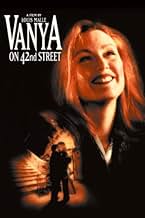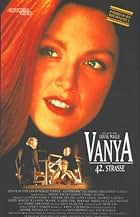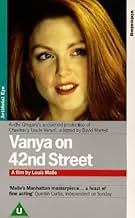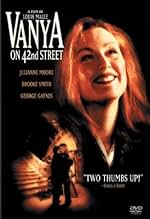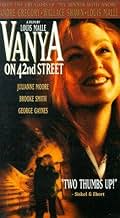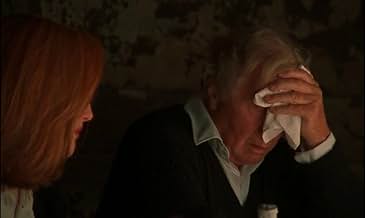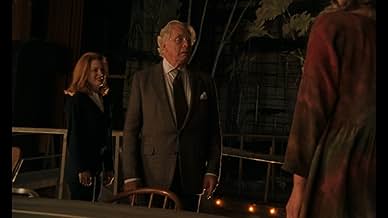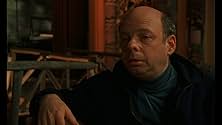VALUTAZIONE IMDb
7,3/10
5479
LA TUA VALUTAZIONE
Aggiungi una trama nella tua linguaNew York actors rehearse Chekhov's "Uncle Vanya" in a dilapidated theatre.New York actors rehearse Chekhov's "Uncle Vanya" in a dilapidated theatre.New York actors rehearse Chekhov's "Uncle Vanya" in a dilapidated theatre.
- Regia
- Sceneggiatura
- Star
- Premi
- 3 vittorie e 13 candidature totali
Ayad Akhtar
- Audience member
- (non citato nei titoli originali)
Oren Moverman
- Flip Innunu
- (non citato nei titoli originali)
Recensioni in evidenza
This is a beautiful inquiry into the human condition. If you doubt that Chekhov was a brilliant writer, then this will be your gateway to excellence. The movie sports a wonderful cast while supposedly filmed during a dress-rehearsal. This is truly a movie to watch when in a serious and reflective mood, but despite such, it is a must see and an insightful gift from a phenomenal writer.
Like many slice of life films, this explores the hearts of the characters. Their desires and dreams, like many of us, do not reflect what becomes of their lives. Thus a questioning must occur. Am I dealt this hand or could I have been more?
If you like slice of life films, this is a must see.
Like many slice of life films, this explores the hearts of the characters. Their desires and dreams, like many of us, do not reflect what becomes of their lives. Thus a questioning must occur. Am I dealt this hand or could I have been more?
If you like slice of life films, this is a must see.
I sympathise with the Russian poster who took exception with Mamet's tampering with Chekhov but I still admire this film a great deal. As a non-Russian and non-Russian speaker I have loved Chekhov since the time I was able to distinguish great writing from mediocre and I have always felt that no matter how fine a given translation I was still losing the occasional untranslatable nuance to which Russian speakers have access. Vanya is also one of my favourite Chekhov plays and I just wallowed in this wonderful version. It's magical the way that once inside the rehearsal space with the actors schmoozing Wally Shawn stretches out on a bench almost imperceptibly and Larry Pine asks Phoebe Brand casually how long they've known each other and unless you really know Chekhov you'd think this was just actor small-talk instead of the first lines in the play between the Doctor and Nanny,or, to put it another way, Malle has led us both artfully and seamlessly into the performance and then, having done so, he throws in a touch of the Brechts by deliberately reminding us we're watching actors acting and not people living. The first time he tips his glove is via Wally Shawn's cup which has I Love NY written on it then later Andre explains to the visitors (who, I suspect, have been planted there for just that purpose) that it's now a different time. The acting throughout is beyond praise and a wonderful high note for Louis Malle to end his career. 10 out of 10 going away.
In New York, the cast of Anton Chekhov's "Uncle Vanya" rehearse the play in a dilapidated theater on the 42nd Street.
The arrogant and selfish Professor Serybryakov (George Gaynes) is an elderly intellectual married with his gorgeous and younger second wife Yelena (Julianne Moore) that feels trapped in a prison with her marriage. They live in a farm that supports their lifestyle with the Professor Serybryakov's brother-in-law from the first marriage Vanya (Wallace Shawn), who manages the family business with Professor's daughter from his first marriage, Sonya (Brooke Smith), a plain single young woman and Vanya's mother. The local Dr. Astrov (Larry Pine) visits the family every day since he is in love with Yelena. She talks with him about his feelings for Sonya, but Astrov misunderstands and believes she is also in love with him. One day, Sonya confides to Yelena that she has an unrequited love for Dr. Astrov. When Professor Serybryakov discloses his intention of selling the real estate, there is a crisis in the family.
"Vanya on 42nd Street" is a filmed rehearsal of Anton Chekhov's play "Uncle Vanya" by Louis Malle. The talkative story about frustrated lives, where every character wish to have a different existence, is surprisingly engaging since there are no costumes or scenarios, but excellent direction and performances. The beginning is a little boring, I agree, but give a chance to this movie and you will certainly have a great (favorable) surprise. My vote is seven,
Title (Brazil): "Tio Vanya em Nova York" ("Uncle Vanya in New York")
The arrogant and selfish Professor Serybryakov (George Gaynes) is an elderly intellectual married with his gorgeous and younger second wife Yelena (Julianne Moore) that feels trapped in a prison with her marriage. They live in a farm that supports their lifestyle with the Professor Serybryakov's brother-in-law from the first marriage Vanya (Wallace Shawn), who manages the family business with Professor's daughter from his first marriage, Sonya (Brooke Smith), a plain single young woman and Vanya's mother. The local Dr. Astrov (Larry Pine) visits the family every day since he is in love with Yelena. She talks with him about his feelings for Sonya, but Astrov misunderstands and believes she is also in love with him. One day, Sonya confides to Yelena that she has an unrequited love for Dr. Astrov. When Professor Serybryakov discloses his intention of selling the real estate, there is a crisis in the family.
"Vanya on 42nd Street" is a filmed rehearsal of Anton Chekhov's play "Uncle Vanya" by Louis Malle. The talkative story about frustrated lives, where every character wish to have a different existence, is surprisingly engaging since there are no costumes or scenarios, but excellent direction and performances. The beginning is a little boring, I agree, but give a chance to this movie and you will certainly have a great (favorable) surprise. My vote is seven,
Title (Brazil): "Tio Vanya em Nova York" ("Uncle Vanya in New York")
Chekhov's Uncle Vanya stripped down to its bare essentials when a group of New York actors rehearse in a decaying theatre with no set dressings or props but just their talent, accompanied by David Mamet's modern adaptation of the play. Off course it may be stagy but you fall under the actors spell and that's what it's all about.
There's no shortage of intelligent work in film. But here we have one of the most complexly referential things I've ever seen. Simple self-reference points to itself. Common self-reference points to the viewer defining the experience.
But Mingus used to say why have three threads when you can have seven? Here, some of the most adventurous thinkers in film give us four threads, actually four and a half.
We have the Chekhov play and the Mamet wrapping. Make no mistake that this is not an editing or a translation, but an annotation. We have two perspectives simultaneously. Add to that the notion of the play not as a play for an audience as intended, but an event conducted regularly by the performers for their own sake. This is a creation orchestrated by Gregory, the third thread. One can clearly see in some scenes neither Chekhov nor Mamet but artists collaborating in dialogs. The inner eyes and the outer eyes differ.
Fourth, we have Malle's creation which introduces us into the equation with deliberately shaky and sometimes misframed camerawork. We aren't part of any prior experience, but the actors do include the camera in their collaboration, as an independent thread. Watch how Andre works the camera.
And finally, we have the framing of the artists in real life. This is not simultaneous with the others and in any case excludes the filmmaker.
I recall seeing Paul Newman in the Color of Money in the first scene, acting on three levels simultaneously. It took my breath away. Here, the purpose of the whole contrivance is to challenge the actors (and the viewers!) to participate in a jazz ensemble of acting where the layer of reality is constantly shifting. They chose Uncle Vanya as the base for a reason, because his evershifting foci of love and hate in pairs provide cues for levelshifting.
Shawn really plays on this. His skill wasn't apparent to me on first viewing, especially in the first scenes, where all players are on stage and the non-focus actors have to be invisible. But on repeated viewings one can see his mastery, his shifting forehead! Maybe he could have been a Dostoyevsky. The two young women should be celebrated to the heavens for what they do together. I never believed so many giggles and gasps and stutters and excited silences could be so finely woven, tossed so lightly.
This is really, really good stuff, very smart. So far as an intelligent construction you won't see a superior. I never expect to see four levels at once again in film at least centered in the acting.
But Mingus used to say why have three threads when you can have seven? Here, some of the most adventurous thinkers in film give us four threads, actually four and a half.
We have the Chekhov play and the Mamet wrapping. Make no mistake that this is not an editing or a translation, but an annotation. We have two perspectives simultaneously. Add to that the notion of the play not as a play for an audience as intended, but an event conducted regularly by the performers for their own sake. This is a creation orchestrated by Gregory, the third thread. One can clearly see in some scenes neither Chekhov nor Mamet but artists collaborating in dialogs. The inner eyes and the outer eyes differ.
Fourth, we have Malle's creation which introduces us into the equation with deliberately shaky and sometimes misframed camerawork. We aren't part of any prior experience, but the actors do include the camera in their collaboration, as an independent thread. Watch how Andre works the camera.
And finally, we have the framing of the artists in real life. This is not simultaneous with the others and in any case excludes the filmmaker.
I recall seeing Paul Newman in the Color of Money in the first scene, acting on three levels simultaneously. It took my breath away. Here, the purpose of the whole contrivance is to challenge the actors (and the viewers!) to participate in a jazz ensemble of acting where the layer of reality is constantly shifting. They chose Uncle Vanya as the base for a reason, because his evershifting foci of love and hate in pairs provide cues for levelshifting.
Shawn really plays on this. His skill wasn't apparent to me on first viewing, especially in the first scenes, where all players are on stage and the non-focus actors have to be invisible. But on repeated viewings one can see his mastery, his shifting forehead! Maybe he could have been a Dostoyevsky. The two young women should be celebrated to the heavens for what they do together. I never believed so many giggles and gasps and stutters and excited silences could be so finely woven, tossed so lightly.
This is really, really good stuff, very smart. So far as an intelligent construction you won't see a superior. I never expect to see four levels at once again in film at least centered in the acting.
Lo sapevi?
- QuizFinal film directed by Louis Malle.
- BlooperIn the different acts, some people change clothes, while others don't. Sonya, for instance, wears two different dresses. In a run-through people don't change clothes.
I più visti
Accedi per valutare e creare un elenco di titoli salvati per ottenere consigli personalizzati
- How long is Vanya on 42nd Street?Powered by Alexa
Dettagli
- Data di uscita
- Paesi di origine
- Lingue
- Celebre anche come
- Vanya on 42nd Street
- Luoghi delle riprese
- Aziende produttrici
- Vedi altri crediti dell’azienda su IMDbPro
Botteghino
- Lordo Stati Uniti e Canada
- 1.746.050 USD
- Fine settimana di apertura Stati Uniti e Canada
- 17.636 USD
- 23 ott 1994
- Lordo in tutto il mondo
- 1.746.050 USD
Contribuisci a questa pagina
Suggerisci una modifica o aggiungi i contenuti mancanti

Divario superiore
By what name was Vanya sulla 42esima strada (1994) officially released in India in English?
Rispondi

